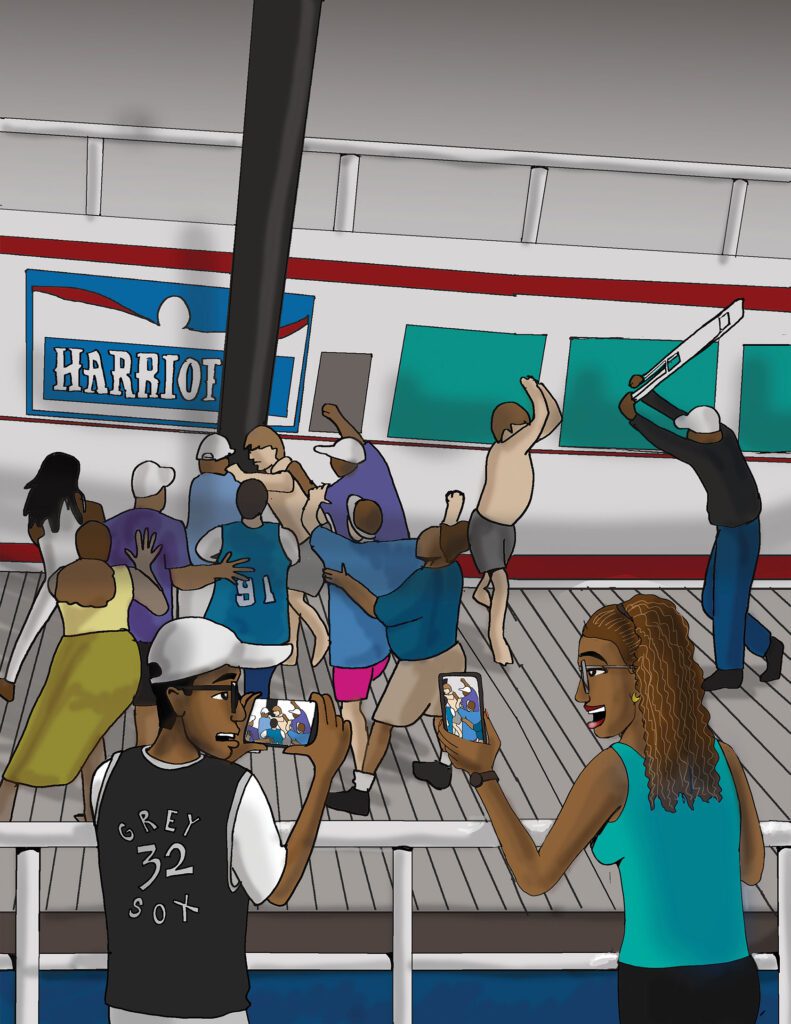
The majority of mainstream media coverage of what transpired on the dock in Montgomery, Alabama, earlier this month treated it as yet another isolated incident, with headlines like “Brawl reignites national debate over race.” In fact, there was nothing to reignite. Systemic racism and the oppression of the country’s Black population is in the air we breathe. It’s a raging forest fire that has never been extinguished. Sure, there are times when the wind direction takes the embers away and the smoke diminishes, but the fire always burns. In that sense, the Black population suffers from constant smoke inhalation and borderline suffocation. The charred remains of fire damage can be seen everywhere in this country, from big cities to small towns.
On Aug. 5, the wind blew over and carried embers to a well-burnt location in the nation’s history, a pier at Riverfront Park in Montgomery. At the same site, enslaved people were brought in by boat on the Alabama River. In the mid-1800s, tens of thousands of enslaved souls were shipped from New Orleans on steamboats plying the Alabama River. The enslaved were chained together and marched down to Commerce Street to be auctioned in Montgomery’s slave market. The city was among the most prominent slave-trading communities in the state and the early seat of power for the Confederacy.
On this August day, the Harriott II steamboat was supposed to dock after a two-hour tour but could not because a smaller pontoon boat was there, and the people associated with the craft defiantly refused to move it. The steamboat’s name, similar to that of the great emancipator Harriet Tubman, could not have been a more symbolic for the conflict that was about to ensue. In 1863, Tubman became the first woman to lead a major military naval operation in the United States when she and 150 African American Union soldiers rescued more than 700 enslaved souls in the Combahee Ferry Raid in South Carolina.
As the Harriott II waited 45 minutes offshore, co-captain Dameion Pickett approached the obstructionist pontoon boat operators and was assaulted by three white members of the defiant crew. Luckily, Christa Owen, a passenger on the Harriott II, captured the entire incident on camera so that the facts of this case could not be disputed.
What captured the imagination of the country’s Black population almost immediately afterwards has been a flood of social commentary. People of color are generating countless memes, GIFs and hashtags with various edited versions of the videotaped incident. Social media proclaimed it was the first time in a long time that we Black people supported each other. The flood of reactions to this incident has become a release valve. The welcome change has helped release some of the pressure that has been building up from recent attacks on voter rights, like the redistricting plans to disenfranchise black voters, moves to eliminate affirmative action — which was put in place to redress unequal treatment and denial of opportunity for people of color — and the whitewashing of children’s history books, touting old lies about how Black people benefited from being enslaved.
On Aug. 5, 2023, we were the volunteer fire department. We helped extinguish this brush fire from co-captain Pickett throwing his hat in the air proclaiming “it’s on” right after the first punch was thrown at him to “Aquamayne,” the 16-year-old who jumped off the Harriott II boat to swim to Pickett’s aid. We all came to the aid of one of us in distress that day.
When the police arrived, they did not automatically target people of color and unleash inappropriate state violence. They did not do so because Pickett’s defenders had done nothing wrong but protect someone that was trying to do the right thing.
That day, white entitlement and privilege was not allowed run roughshod over people of color. It was a dramatic break from the status quo right in America — and an example of how we all should proceed moving forward, having each other’s backs as we push back against a rising tide of racism.







